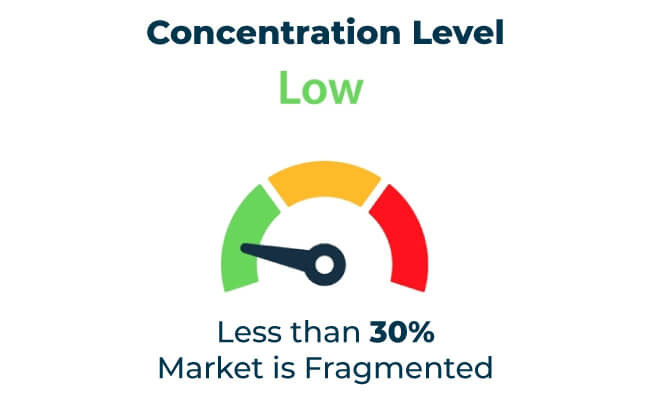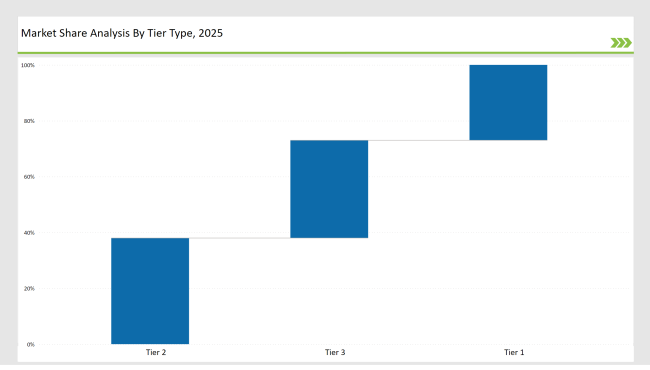The inverted squeeze bottle market remains highly competitive and moderately fragmented, consisting of Tier 1, Tier 2, and Tier 3 players. Market leaders control about 27% of the market, with Amcor, Berry Global, and AptarGroup at the forefront.
Their dominance comes from advanced manufacturing techniques, strong supply chain networks, and innovative dispensing solutions tailored for food, personal care, and pharmaceutical applications. The demand for inverted squeeze bottles continues to rise as consumers seek convenience, controlled dispensing, and spill-proof packaging in daily-use products.
Tier 2 players, including Silgan Holdings, Plastipak, and Alpla, make up 38% of the market. These companies emphasize cost-efficient, customizable, and high-performance squeeze bottle solutions, primarily serving mid-sized brands and private-label manufacturers. Their focus on balancing affordability with premium packaging technology positions them as strong competitors in the market.
Tier 3 players, representing 35% of the market, consist of regional manufacturers and niche brands. These companies specialize in biodegradable materials, lightweight packaging, and specialty dispensing caps to meet sustainability goals and evolving consumer demands. Their ability to quickly adapt to market trends and offer tailored solutions makes them a crucial part of the industry’s competitive landscape.
Exclusive Offer: 30% Off on Regional Reports
Get a free sample report and customize your regions for a 30% discount on your regional report!
Global Market Share by Key Players (2025)
| Category | Market Share (%) |
|---|---|
| Top 3 (Amcor, Berry Global, AptarGroup) | 14% |
| Rest of Top 5 (Silgan Holdings, Plastipak) | 8% |
| Next 5 of Top 10 (Alpla, Gerresheimer, Alpha Packaging, RPC Group, C.L. Smith) | 5% |

The Inverted Squeeze Bottle Market serves key end-use industries, including
To meet industry demands, vendors offer various solutions, including
Sustainability remains a key focus, with companies investing in biodegradable plastics, lightweight packaging innovations, and energy-efficient manufacturing.
To stay ahead, market leaders invest in automation, AI-driven production, and smart dispensing technology. Companies are implementing predictive maintenance, improved material science, and digital twin technology to streamline production. Strategic collaborations with raw material suppliers and new energy-efficient packaging methods continue to shape the industry.
Additionally, as regulatory compliance tightens, brands are focusing on BPA-free materials, recyclable packaging, and non-toxic dispensing systems to align with evolving industry standards. Continuous advancements in smart packaging, antimicrobial bottle coatings, and eco-friendly plastics are further revolutionizing the market.
Year-on-Year Leaders
Technology suppliers must prioritize sustainability, automation, and user-friendly designs to stay competitive.
Check Free Sample Report & Save 40%!
Select your niche segments and personalize your insights for smart savings. Cut costs now!
| Tier Type | Example of Key Players |
|---|---|
| Tier 1 | Amcor, Berry Global, AptarGroup |
| Tier 2 | Silgan Holdings, Plastipak, Alpla |
| Tier 3 | Gerresheimer, Alpha Packaging, RPC Group, C.L. Smith |

| Manufacturer | Latest Developments |
|---|---|
| Amcor | Launched recyclable inverted squeeze bottles (January 2024). |
| Berry Global | Developed biodegradable bottle designs (March 2024). |
| AptarGroup | Introduced self-sealing, leak-proof squeeze bottles (April 2024). |
| Silgan Holdings | Implemented cost-effective, durable squeeze bottle solutions (May 2024). |
| Plastipak | Expanded smart dispensing technology integration (June 2024). |
Leading companies in the Inverted Squeeze Bottle Market leverage advanced automation, smart dispensing technology, and sustainable packaging innovations to maintain their competitive edge.
The Inverted Squeeze Bottle Market is evolving rapidly with smart dispensing innovations, eco-friendly materials, and automation-driven production. Manufacturers are integrating biodegradable plastics, IoT-enabled freshness tracking, and leak-proof dispensing mechanisms to enhance product usability and sustainability.
Additionally, advancements in customization, digital printing, and lightweight bottle structures are shaping the market's future, offering brands greater flexibility and reduced environmental impact.
Leading manufacturers include Amcor, Berry Global, and AptarGroup.
The top 10 players collectively hold approximately 27% of the global market.
The market concentration is medium, with top players controlling 30% - 60%of the industry.
Explore Packaging Formats Insights
View Reports
Thank you!
You will receive an email from our Business Development Manager. Please be sure to check your SPAM/JUNK folder too.